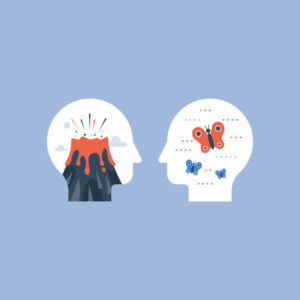Anger is a powerful emotion that can sometimes feel uncontrollable. When we’re angry, it feels like everything in the world is against us and we just want to lash out at anyone or anything. Unfortunately, when we allow our anger to take control, it often leads to negative consequences. In this blog post, we will discuss some tips for dealing with anger healthily. We’ll provide strategies for managing explosive emotions, and offer advice for keeping your cool during difficult situations.
Contents
Defining Anger
Anger is an emotion that is characterized by feelings of hostility, frustration, or resentment. When we experience anger, our body releases adrenaline and cortisol, which prepare us to fight or take flight. This natural response is beneficial in situations where we need to defend ourselves from danger. However, when we’re constantly feeling angry or stressed, it can take a toll on our physical and mental health.
Although it is a normal emotion, anger can sometimes be difficult to deal with. This is because it is often accompanied by strong feelings of frustration, anxiety, or even rage. When we’re unable to effectively deal with our anger, it can lead to problems in our personal and professional lives. We may find ourselves constantly arguing with loved ones, or acting out in ways that are harmful to ourselves and others.
Signs Of Anger

It is important to recognize the presence and ways by which anger presents itself in our life before knowing ways of dealing with anger. Some common signs of anger include:
- feeling irritable or ‘on edge’
- having a short temper
- being easily annoyed
- feeling frustrated or resentful
- lashing out at others, either verbally or physically
- engaging in risky or destructive behaviors
- having difficulty sleeping
- clenching your jaw or fists
- feeling your heart rate increase
- sweating
- trembling
- shortness of breath
- feeling like you’re constantly in a bad mood
- engaging in risky behaviors
- feeling like you could explode at any moment
- acting impulsively or recklessly
- having difficulty concentrating
- yelling or losing your temper
These signs can vary in intensity, frequency, as well as events that trigger these responses. It is important to consider individual differences while dealing with anger issues.
Causes Of Anger

An effective and vital part of knowing how to dealing with anger is recognizing the factors that cause them. If you learn to identify the root cause of your emotions, you can work on resolving the issue at hand to prevent the negative issues at hand. Some common causes of anger include:
- perceived threats or injustices
- not receiving external support and affection
- feeling helpless or powerless
- frustration with yourself or others
- stressful life events
- chronic physical pain or illness
- work-life imbalance
- genetic factors
- other mental health conditions such as bipolar disorder, ADHD, PTSD, etc.
- personality traits (e.g., perfectionism, low tolerance for frustration)
- unresolved trauma
- lack of sleep
- failures or rejections
- chemical imbalance in the brain
- poor self-esteem
- exposure to constant negativity
- unhealthy living environments
- invasion of your personal space
- witnessing someone else receiving unfair treatment
Anger can arise due to one or a combination of multiple of these factors. These causes serve as a guide to help you understand your anger triggers.
Dealing With Anger
There is a multitude of ways to deal with anger. It can happen either through intervention by a mental health professional, such as a psychiatrist, therapist, or counselor, or by adopting some self-help strategies.
Professional Help

If you have difficulties managing and dealing with your anger on your own, it may be time to seek professional help. Mental health professionals can provide you with the tools and resources needed to deal with your emotions healthily. They can also help you identify any underlying issues that may be contributing to your anger.
Some commonly practiced types of therapy used for treating anger include:
Cognitive-behavioral therapy
This type of therapy focuses on identifying and changing the thoughts and behaviors that contribute to your anger. CBT also teaches anger management techniques, such as relaxing your body and breathing deeply to calm yourself down.
Dialectical behavior therapy
This type of therapy focuses on teaching you how to cope with strong emotions and tolerate distress. It can help learn how to manage triggers, healthily express yourself, and develop better-coping skills. DBT teaches skills like mindfulness and regulation to help you control your anger.
Interpersonal therapy
This type of therapy focuses on improving communication skills and resolving conflicts in personal relationships. It strengthens your ability to express yourself in a healthily, form boundaries and manage disagreements.
Psychodynamic therapy
This type of therapy explores the unconscious thoughts and emotions that may be contributing to your anger. Psychodynamic therapy can help you understand how your past experiences are affecting your present and learn new ways of coping with anger.
Group Therapy
This type of therapy provides support and guidance from others who are dealing with similar issues. It can help develop healthy coping skills and learn to express your emotions constructively.
Medication
In some cases, medication may be prescribed in addition to therapy to help manage anger. Medication can be used to treat underlying mental health conditions that may be contributing to your anger, such as anxiety or depression. Some commonly prescribed medications for anger include:
- antidepressants
- anti-anxiety medications
- mood stabilizers
- psychiatrists may also recommend medication to help with impulse control or sleep problems, which can contribute to anger.
Self Help Tips

In addition to seeking help from professional help, you can also engage in various self-copying strategies. These tips will not only help dealing with your anger but also lead to the overall betterment of your emotional and mental health.
Acknowledge Your Emotions
It is important to validate your feelings to move through them. Recognize that it is normal to feel angry in certain situations. Avoid judging yourself for having these emotions and instead, focus on finding a solution. Despite being positive or negative, our emotions are our responsibility and we have to process them.
Talk to someone you trust
Talking openly about our feelings can be very helpful in managing them. It allows us to vent our frustration in a safe and supportive environment and can help us gain clarity about the situation. This can either be a parent, caregiver, another family member, partner, or even your pet!
Take a break
Sometimes, the best thing we can do when we’re feeling angry is to take a step back from the situation. This gives us time to calm down and assess the situation more clearly. It also allows us to avoid saying or doing something we might regret later.
Nourish yourself
It is important to take care of yourself physically when you are dealing with strong emotions. Make sure to eat regular meals, get enough sleep, and exercise regularly. This will help you to feel better physically and mentally and will give you the energy you need to deal with your anger.
Create a plan
When you know what triggers your anger, it can be helpful to create a plan for how to deal with those situations. This might involve walking away from the situation, talking to the person who angered you, or taking some time to calm down before responding. Having a plan in place ahead of time can help you to react more calmly when anger strikes.
Breathe
Deep breathing is one of the quickest and most effective ways to calm down when we’re feeling angry. It helps to slow our heart rate and relax our muscles. It can also help to clear our minds and allow us to think more clearly. Breathing exercises can be done anywhere and only take a few minutes.
Get some exercise
Exercise is a great way to release pent-up energy and tension. It can also help to improve our mood by releasing endorphins. Physical activity also provides a distraction from the things that are causing us to feel angry. You can either go for a walk or run, do yoga, dance, use a skipping rope, join the gym, try at-home exercises or do mindful stretching.
Count to ten
This oldie but goodie really does work. Counting to ten (or even twenty) gives us time to calm down and collect ourselves before responding to the situation. It’s important not to use this time as an opportunity to bottle up our anger, but to really focus on taking some deep breaths and relaxing our bodies
Express your feelings in a creative outlet
Sometimes, we may not be able to express our anger directly to the person or situation that is causing us frustration. In these cases, expressing our feelings in a creative outlet such as writing, painting, or music can be very therapeutic.
Listen to music
Music can have a very calming and soothing effect on the mind. It can help us to relax and de-stress, which can help manage anger. It also allows us to express ourselves in a creative and non-destructive way. You can either put on your favorite songs or use relaxing ASMR or white noises.
Take some time for yourself
It is important to take some time for yourself when you are feeling angry. This means taking some time to do something that you enjoy or simply taking some time to relax and de-stress. This will help you to recharge your batteries so that you can deal with the situation in a more constructive way.
Avoid making decisions when you’re angry
When we’re angry, we’re more likely to make rash and impulsive decisions. It is important to take some time to calm down before making any decisions. This will help you to make more constructive and rational decisions.
Write it down
Writing can be a very therapeutic activity. Writing down our thoughts and feelings can help us to gain clarity and understanding about them. It can also be cathartic to simply get them out of our heads. Maintain an anger journal to write down your emotions in. This will also help you gain self-reflection and observe any recurring patterns in the flow of your emotions.
Create a support network
Having a supportive network of family and friends can be invaluable when dealing with difficult emotions. These people can provide us with emotional support and understanding during tough times. Acknowledge the presence of your loved ones who support and are there for you and utilize this support.
Practice relaxation techniques
Many different relaxation techniques can help reduce stress and anxiety. Some popular techniques include yoga, meditation, deep breathing, and progressive muscle relaxation. These help you regain calmness and inner peace with your heightened emotions.
Stimulate your physical senses
Certain smells, tastes, textures, and sounds can have a calming effect on the mind. This is because they stimulate our physical senses and help to distract us from the things that are causing us to feel angry. You can try using squeeze balls, certain essential oils, getting a massage, or eating your favorite foods.
Challenge your negative thoughts
When we’re feeling angry, we often have negative and distorted thoughts about the situation. It is important to challenge these thoughts in order to gain a more realistic and balanced perspective.
Use humor
Laughter really is the best medicine. When we laugh, it releases endorphins and helps to reduce stress. This can be a great way to diffuse a tense or angry situation. You can watch your favorite comedy movie, read a funny book, or tell jokes with friends.
Identify your triggers
Identifying and acknowledging the triggers of your angry reactions is an important step in managing your anger. Once you know what sets off your anger, you can begin to work on avoiding or dealing with these triggers more constructively.
Practice relaxation techniques
When we’re feeling angry, our body is in a state of high alert. This can lead to muscle tension, increased heart rate, and shallow breathing. relaxation techniques such as deep breathing, progressive muscle relaxation, or mindfulness can help your body to relax and ease the physical symptoms of anger.
Engage in healthy coping mechanisms
When we’re feeling angry, it’s important to find healthy ways to cope with our emotions. Some healthy coping mechanisms include exercise, journaling, or listening to music.
Think before you speak or act
It’s important to take a step back and think about the situation before responding in anger. This will help you to avoid saying or doing something you might later regret. It can also help you to find a more constructive way to deal with the situation.
These are just some of the many different ways that you can deal with anger. It is important to find what works best for you and to practice these techniques regularly. Remember, dealing with anger is a process, so take it one step at a time. The most important thing is to find what works for you and to be patient with yourself. It takes time to learn how to manage our emotions, but it is possible to do so in a healthy way.
Conclusion
To conclude the above, anger is a normal and healthy emotion. However, it can become problematic when it is not managed constructively. There are many different strategies can deal with anger more positively. Find what works for you and be patient with yourself as you learn to cope with this emotion healthily.
For more information, please contact MantraCare. Anger is a powerful emotion that is experienced by every individual at some point in their lives. If you have any queries regarding Online Anger Counseling experienced therapists at MantraCare can help: Book a trial Online therapy session


